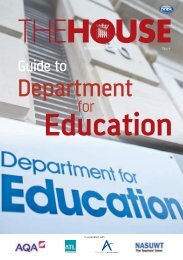Oracy
2fcBkno
2fcBkno
You also want an ePaper? Increase the reach of your titles
YUMPU automatically turns print PDFs into web optimized ePapers that Google loves.
5. What helps and hinders oracy in schools?<br />
Research indicates teachers’ engagement with oracy-based activities<br />
can be limited due to:<br />
• Pressure to maintain a fast pace to deliver other outcomes 135<br />
• Insufficient knowledge to confidently model and discuss language<br />
with their pupil 136<br />
• Anxiety about handing control over to pupils, which talk-based<br />
activities can entail 137<br />
Nearly a third of class teachers believe that nothing limits how often<br />
they initiate activities involving talk and only a very small proportion<br />
overall feel oracy-based activities are not effective in supporting pupils’<br />
learning (1%). xxxii On the other hand, lack of time and fears about how<br />
pupils might respond are important barriers to more widespread use<br />
of such activities. These factors are far greater barriers than a lack of<br />
willingness on teachers’ and schools’ part.<br />
Top three factors that can limit<br />
secondary school teachers’<br />
use of talk (n=409):<br />
• There is not time (32%)<br />
• These activities make<br />
shy or quiet pupils feel<br />
uncomfortable (32%)<br />
• These activities can lead<br />
to distraction or disruptive<br />
behaviour (29%)<br />
What limits whether you initiate activities that involve your pupils talking? 562<br />
Not applicable - nothing limits how often I initiate activities that involve<br />
your pupils talking, either with you or with one another<br />
There is not time<br />
31%<br />
31%<br />
These activities make shy or quiet pupils feel uncomfortable<br />
25%<br />
These activities can lead to distraction or disruptive behaviour<br />
21%<br />
My school prioritises pupils producing written work<br />
There is nothing to show for these activities afterwards<br />
These activities are not relevant to external assessments or exams<br />
Pupils do not have the skills they need to undertake these activities<br />
effectively<br />
My subject does not lend itself to these activities<br />
18%<br />
16%<br />
14%<br />
13%<br />
12%<br />
The school leadership team does not encourage such activities<br />
I am nervous about what my collegues would say if they walked into my<br />
lesson during such an activity<br />
Don’t know<br />
Other<br />
These activities are not relevant to the content of our school’s curriculum<br />
4%<br />
4%<br />
3%<br />
3%<br />
3%<br />
These activities are not effective in supporting pupils’ learning<br />
There are fewer barriers to initiating talk-based activities in<br />
independent schools. 39% of those working in independent<br />
schools say nothing limits how often they initiate such<br />
activities, whereas this is only true of 29% of respondents<br />
in local authority schools and 27% in academies or free<br />
schools. Interviewees suggest this may be because of the<br />
expectations the parents of independent school pupils<br />
have that their children will leave school able to speak well,<br />
which in turn legitimises teachers’ use of talk in lessons.<br />
56<br />
1%<br />
0% 20%<br />
40%<br />
The prevalence of barriers to talk-based<br />
activities also varies between phases.<br />
35% primary school teachers say nothing<br />
inhibits how often they initiate talk-based<br />
activities, significantly more than the 27%<br />
of their secondary counterparts. Over<br />
half (55%) of Early Years practitioners say<br />
nothing limits the number of talk activities<br />
they initiate.<br />
xxxii<br />
Practitioners were asked what limits their engagement with oracy, defined as ‘the development of children’s capacity to use speech to<br />
express their thoughts and communicate with others in education and in life, and talk through which teaching and learning is mediated’<br />
(based on Alexander, 2012: 10).




